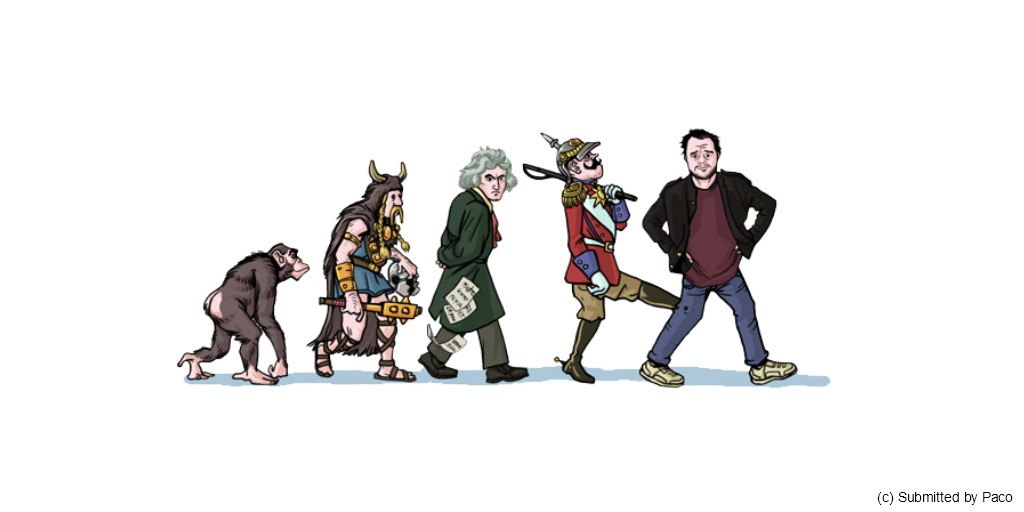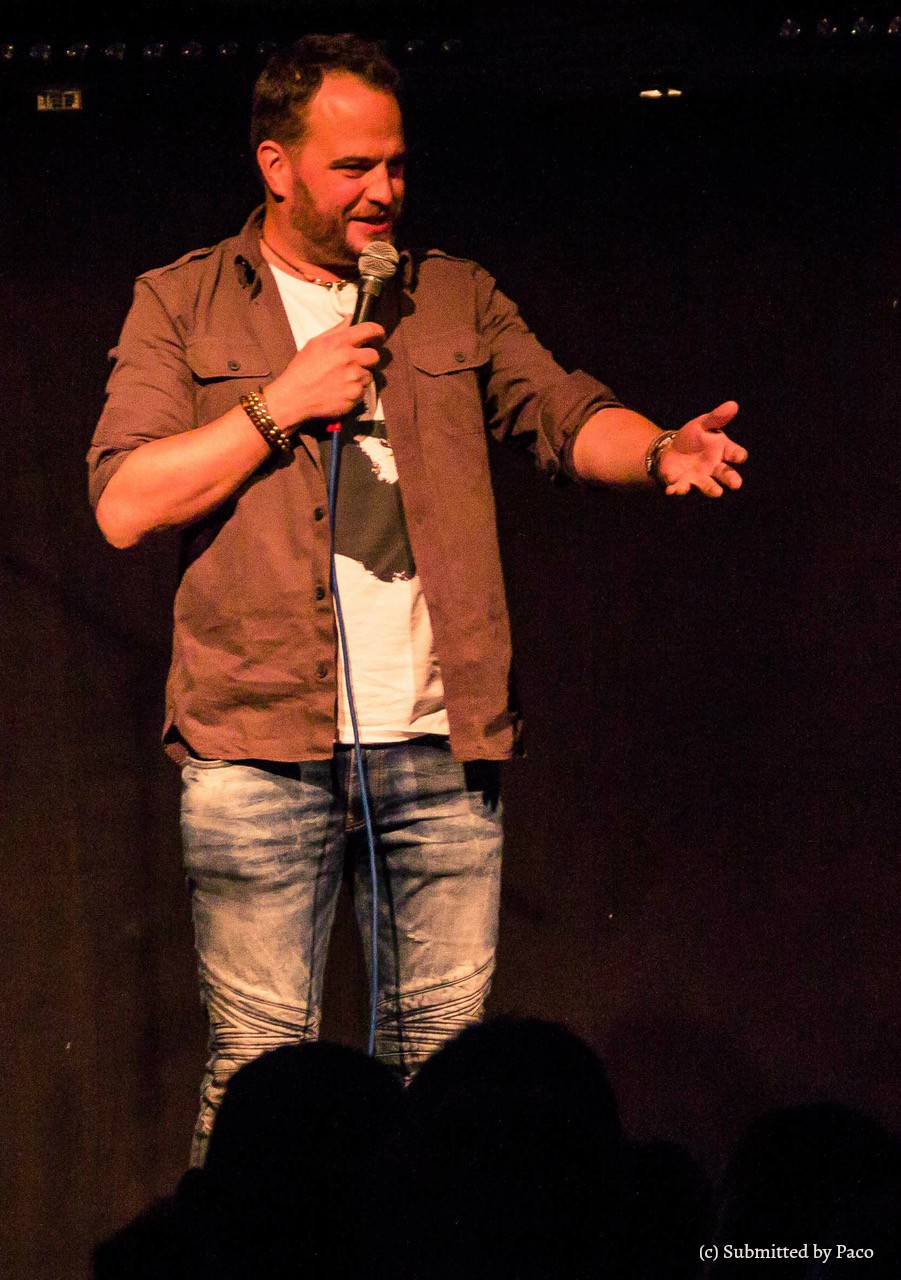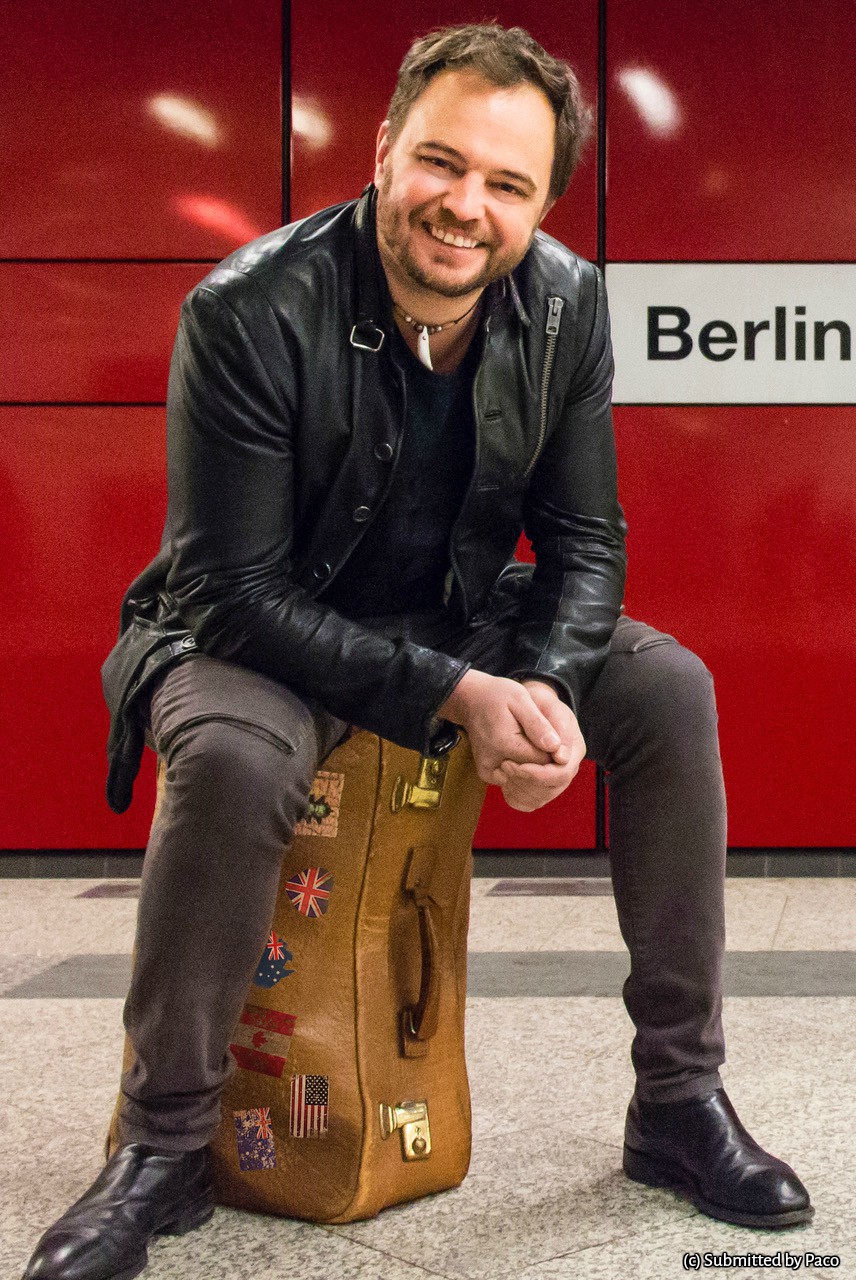
Comedy that makes people laugh, stop and think
“Half my life, I ran away from being German. Then I realized that’s the most German thing you could possibly do,” says comedian Paco Erhard. He moved back to Germany in 2016, after having spent 16 years abroad living in countries like the United Kingdom, Italy, Spain, the USA, and Australia, and performing in many more. A literature and philosophy graduate, he brings his passion of questioning and researching to Canadian stages with his award-winning program “5 Step Guide to Being German.”
Born as Erhard Hübener, he earned his nickname Paco from a neighbor in Spain. As a literature and philosophy student, he decided to take a break from university life and travel the world, Jack Kerouac-style. Working as a hotel entertainer and later a comedy MC on Spanish holiday islands, he discovered the perfect combination of writing, the stage, and travelling: stand-up comedy. From Spain, he moved to London and had his breakthrough at the Edinburgh Fringe Festival. In the years that followed, he toured his shows to comedy festivals around the globe. In 2016, he moved back to Germany and has made Berlin his base for his continuing travels through Germany, Europe, and the world.
His trademark: comedy that makes people laugh, stop and think.
SoGerman: How much research do you do before you present a new show?
Paco: It depends. My “5-Step Guide to Being German” show is very much about Germany and I did a lot of research for that. I’ve written and toured five different shows now and “5 Step Guide to Being German” is my first one; I wrote it in 2011. I was always interested in why we Germans are the way we are. It’s fascinating. For example, why are we Germans such smart-asses? If somebody says something slightly wrong, we Germans find it very, very hard to leave that uncorrected. Why is that? If you follow that, you can at least find traces in history why that came about.
I also enjoy making comparisons between elsewhere and Germany. We Germans can learn a lot from others, but others can learn from our example too. It’s just fascinating to Canadians and Australians that we Germans are allowed to drink outside and to smoke inside. Because for some weird reason, our government seems to think that we’re adults. (smirks) As a German, before you go and live elsewhere, you don’t know that that’s pretty special about Germany. And when you travel, you realize, “Wow, that’s pretty cool that we can do that.” Same goes for people from other countries: Nobody can really appreciate or even fully understand their own country before they have experienced others in comparison.
Whenever I can do research about something, I am going to do that. Because knowledge is fun.
(SG) You perform in English, German and Spanish? How does that work? Do you have to adapt jokes?
(P) Most of my shows are still in English, though I now perform in German a lot too. There was a transitional period when I started doing shows in German. I still remember the first time I knew I had to prepare a German show and somehow I had very little time to write. I was in Melbourne at the time, and there’s quite a German community in Melbourne. So I put on a couple of cheap preview shows in German for Germans and everybody else who speaks German. I thought, “Why should I have to prepare much? I’m just going to say what I normally say, just in a different language. How hard can it be?” The answer is: Very bloody hard! Very, very, very hard! I sucked in those shows. I was really terrible, especially in the first show obviously. After that one, I sat down for a week and really did my homework.
What we do in stand-up comedy, part of the art is to make it all sound spontaneous. A lot of thinking and writing and tinkering and finding just the right way to say a thing – there’s a lot of craft in it. And when you try to say the same thing in German all of a sudden, maybe the sentence structure is in the way, so that your punchline is in the middle of the sentence. Or a cultural reference doesn’t work in German. Or Germans simply have a totally different view or knowledge of a certain subject matter, and you therefore have to play with different expectations. And if you’re not prepared for all these – like I was – that’s really not good!
Obviously you can translate some jokes, but there’s still a lot of homework with the language. You have to sit down and craft a joke for a long time. Stand-up comedy is an extremely efficient art form. You work a lot to make it as funny as possible with as few words as possible so you can get the most laughs possible. Whatever doesn’t add subtracts. Good comedy is super lean – you don’t want a gram of fat on it.
So when you transfer jokes from one language to another, wherever it is even possible, you have to adapt them a lot. Language-wise, but also in regards to where people come from mentally, what they know and expect, how you can play with them.

(SG) So has it been easy to adapt to German comedy audiences and their expectations?
(P) It depends. There’s an amazing underground comedy scene in Berlin, with comedy-savvy, young, intelligent audiences. I love performing for them.
However, unfortunately so much German comedy is painfully stereotypical, especially on TV. It confirms the dumb old stereotypes instead of showing people something new and making them think.
Good comedy punches up, as they say, it criticizes the powers instead of punching down, for example instead of making fun of the weak, of minorities, of easy targets. Sadly in Germany, there are still too many people who enjoy exactly that. They want to hear those stupid, hackneyed jokes about Turkish people, Muslim people, gay people, which confirm the old stereotypes that make them feel safe, because they’re too scared to go and meet people like that. They don’t want to be challenged; they want their mental status quo confirmed. They want to laugh at people who are different, because they are secretly scared of them, and by that confirmation feel less scared.
I’m sorry, but I’m not going to do that. I want you to start thinking; I want people to start thinking about themselves and their prejudices and hypocrisies. And if I can make that happen with comedy then, that’s amazing.
A stereotype I hate about us Germans is that we don’t have a sense of humour. That’s not true. We do. But there is a tiny kernel of truth in it. Classic Germans love order so much and are so addicted to safety and reliability and predictability, that they don’t dare to venture out of that comfort zone. But great humour is just the opposite of order. Humour is anarchic; it undermines perceived certainties; it’s chaotic. And unfortunately some Germans are scared of that. That’s why humour on German TV is more often than not utter crap.
(SG) You said “half my life, I ran away from being German. Then I realized that that’s the most German thing you could possibly do”. What do you mean by that?
(P) When you tell a Spanish person who’s in a different country, “Look I have a Spanish friend, you should totally meet him”, a Spanish person would say, “Great, let’s meet him.” Germans, more often than not, if you say “There’s a German you need to meet”, we go, “Why??? He’s probably some idiot and then I have to save the reputation of my country again… ” We don’t really trust the rest of our country to be nice people, because we all have seen classic German tourists travel and we all go, “Yeah, but I’m not like that.”
We have a weirdly negative self-image. We think, “I am different from those normal Germans.” I think in reality, it’s probably the majority of us by now who are pretty nice, pretty cool. We are the new “normal” Germans. But we don’t realize that and think the horrible ones are the normal ones. There’s still a large part of Germans who are uncomfortable with who we are. Because we are very aware of our dark history, but also because we are aware of the stereotypes we know are there about us. We think, “Oh God, if I say I’m German now, they’re going to think I am a Nazi and am going to reserve sunbeds with my beach towel, oh my God, oh my God”.

But I think both our image and self-image are changing drastically these days. Because of our environmental policies, because of the great humanitarian effort of helping millions of refugees, because of Angela Merkel standing up to Donald Trump. It’s actually pretty strange: In the last five years, we Germans have been through an image change from “probably Nazis” to “saviors of the free world”. We don’t quite know how to deal with this yet. All of a sudden we have to deal with the fact that people might actually quite like us.
That may sound weird: that we have to deal with the world liking us. But I think there is some truth in that. Because, you see, Germany only became one united country in 1871. Before that we were up to 314 – some say even more than 1,200 – tiny little independent countries, who never fully saw themselves as one big entity. The questions “What is German? Who are we Germans? Where is Germany exactly?” is much older than Germany itself. The one thing that united us for long stretches of history was our feeling of being hard done by the large powers all around us and especially our enmity with France. Especially in 1871 and in the German Empire that followed, under the Kaiser, and then even more so after WWI, after the Versaille Treaty that was considered extremely unfair and mean-spirited. So, our enmity with others forged us together and allowed us to forget that we didn’t really have a clue who we were as one country, that we were internally extremely different. Kurt Tucholsky wrote in 1929 that Germans travel in order to check if other people are deutschfreundlich (=German friendly). A word only we Germans would have, born out of that old defiance.
So our defiant, sulking feeling of “nobody likes us” actually gave us an “us” to begin with, gave us coherence, distracted us from our diversity. And sometimes I think that even today we don’t dare to give up this feeling of “people don’t like us”, because without it, we would lose that old false stability. All of a sudden we’d be thrown back to having to think about who we actually positively are. So I do think that being liked all of a sudden actually subconsciously scares us. It’s a challenge we’ll have to meet.
Somehow deep down inside many Germans still think that people around the world don’t like us, when in my experience most people do like us. Or at least think, “I don’t care which country you’re from, as long as you’re a good person.”
(SG) What role does humor play in a global world?
(P) It could play a huge one. Humour is a great tool for communication and international understanding. It’s a form of communication that manages to gently question long-held beliefs on both sides, without being destructive. It’s been called a “third space” between two different cultures, in which both sides playfully venture outside of their comfort zone and carefully discover the other. If you can talk to somebody and laugh with them, if you can show them that you can also laugh at yourself, then that will normally be met by their willingness to laugh at themselves, and you meet in the middle. The other side might be completely different from you, but you have a way of talking to each other that endears each to the other. A deliberately playful way of communication instead of the old serious butting of heads and trying to be right.
So, yes, especially nowadays, we clearly need way more humour. With more humour, the world would be a better place. If everybody stopped taking themselves so bierernst, so bitterly seriously.
(SG) What role do you think do comedians play in this cultural exchange?
(P) Comedy can be super powerful. Good comedians, I think, can definitely make a positive difference. Especially in times that might get pretty serious.
Two of my German role models, Kurt Tucholsky and Heinrich Heine, lived in precarious times. Heine was an exile because his books were forbidden in Prussia and Kurt Tucholsky was a left-wing writer and publicist in the Weimar Republic when the Nazis were getting stronger and stronger. It’s exactly in those times, when freedom and peace are threatened by fearsome powers, that humour can make a difference. Evil powers always take themselves very seriously, and humour and satire are then the weapons that poke holes in that pompousness, who expose the bullsh*t, propaganda, and lies for what they are, and that also give people hope. They are the ones who make you laugh about the horrible things that happen and thereby give you hope and strength.
A situation that is these days mainly the case in the USA. There, these days, it’s often comedians exposing things that are going wrong in the country, they do it in a way that’s accessible and striking, and they tell you that in a way that makes you laugh. And through all that the individual feels empowered and less alone in the face of a scary reality. And you can’t really defend yourself against humour, because if you have to laugh, you kind of acknowledge the truth in the joke.
In dark times, comedy is what helps intelligent people to not despair.
Paco Erhard will perform in Vancouver this September, more information here.